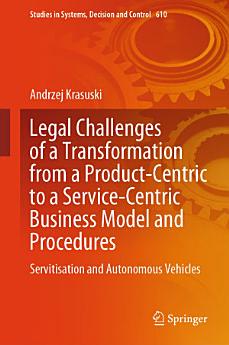Legal Challenges of a Transformation from a Product-Centric to a Service-Centric Business Model and Procedures: Servitisation and Autonomous Vehicles
Andrzej Krasuski
Jul 2025 · Studies in Systems, Decision and Control Book 610 · Springer Nature
Ebook
242
Pages
reportRatings and reviews aren’t verified Learn More
About this ebook
This book provides a comprehensive examination of the key legal issues related to the implementation of digital servitisation in mobility business models, focusing particularly on autonomous vehicles. The investigation explores three primary areas of concern.
Firstly, it analyses the role of autonomous vehicles within digital servitisation mobility business models, addressing the legal classification of these vehicles and the implications of swarm intelligence. This book informs the evaluation of legal relationships between entities that create value through digital mobility services and the underlying technologies, particularly in relation to autonomous vehicles.
Secondly, it considers the legal status and rights of customers in various capacities, including drivers, passengers, and consumers of transportation services provided by autonomous vehicles offering digital service options. Distinguishing these aspects is crucial, as customers are the ultimate beneficiaries of the product-service systems linked to the deployment of autonomous vehicles. Given the complex and multi-stakeholder landscape surrounding these vehicles, customers are exposed to potential risks, especially concerning privacy protection, cybersecurity, and the effective enforcement of consumer rights.
The third area highlights the resources required to implement digital business models, including digital platforms. Digital platforms are integral to the ecosystem of entities that create and deliver digital mobility services. Their market position necessitates the establishment of appropriate legal regulations to mitigate their influence.
This book is aimed at academic researchers and students, as well as legal professionals associated with vehicle manufacturers and their partners engaged in providing digital mobility services. This demographic encompasses car-sharing companies, digital platform providers, and technology suppliers that facilitate these services, including software for vehicle connectivity and positioning technologies.
Firstly, it analyses the role of autonomous vehicles within digital servitisation mobility business models, addressing the legal classification of these vehicles and the implications of swarm intelligence. This book informs the evaluation of legal relationships between entities that create value through digital mobility services and the underlying technologies, particularly in relation to autonomous vehicles.
Secondly, it considers the legal status and rights of customers in various capacities, including drivers, passengers, and consumers of transportation services provided by autonomous vehicles offering digital service options. Distinguishing these aspects is crucial, as customers are the ultimate beneficiaries of the product-service systems linked to the deployment of autonomous vehicles. Given the complex and multi-stakeholder landscape surrounding these vehicles, customers are exposed to potential risks, especially concerning privacy protection, cybersecurity, and the effective enforcement of consumer rights.
The third area highlights the resources required to implement digital business models, including digital platforms. Digital platforms are integral to the ecosystem of entities that create and deliver digital mobility services. Their market position necessitates the establishment of appropriate legal regulations to mitigate their influence.
This book is aimed at academic researchers and students, as well as legal professionals associated with vehicle manufacturers and their partners engaged in providing digital mobility services. This demographic encompasses car-sharing companies, digital platform providers, and technology suppliers that facilitate these services, including software for vehicle connectivity and positioning technologies.
About the author
Andrzej Krasuski [ORCID: /0000-0002-7724-3751] is an associate professor of law and a lecturer at Jan Długosz University in Częstochowa, the University of Gdańsk, and the European Humanities University in Vilnius. His specialisations include the law of new technologies, electronic communications, cloud computing, artificial intelligence, privacy protection, administrative law, and administrative court proceedings. He collaborates with Lincoln Memorial University in Knoxville (USA) as part of The Global Classroom Initiative, the Institute of Communications—National Research Institute, and the International Telecommunications Union. Additionally, he serves as a legal advisor.
Rate this ebook
Tell us what you think.
Reading information
Smartphones and tablets
Install the Google Play Books app for Android and iPad/iPhone. It syncs automatically with your account and allows you to read online or offline wherever you are.
Laptops and computers
You can listen to audiobooks purchased on Google Play using your computer's web browser.
eReaders and other devices
To read on e-ink devices like Kobo eReaders, you'll need to download a file and transfer it to your device. Follow the detailed Help Center instructions to transfer the files to supported eReaders.







